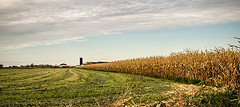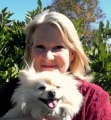You have no items in your cart. Want to get some nice things?
Go shopping
We waited on our new front porch. The field of corn and silo in the distance looked like a calendar page.
Adam and I agreed, the peace we felt here was exactly the sort of thing that Rob and Marlene would be unable to recognize.
Their silver SUV slowly turned in our drive. Light bouncing off the windshield refracted into my eyes at migraine intensity. When I squeezed Adam’s hand he didn’t squeeze back.
“You didn’t tell us how far it really was Adam!” Marlene exclaimed as he opened her door.
“Well you’re right on time. Did you enjoy the drive?”
“Nothing but farmland. Weren’t they going to build an outlet mall around here?”
She straightened up, bracelets on her arms clinking. She was always in full regalia when I saw her.
Lots of make-up and jewellery plus her signature perfume, Orchard Mist.
My couch cushions reeked after a visit. “Hello dear.”
Her smile was all teeth, reminding me of a documentary about primate behaviour. Even chimps recognize insincerity.
Her eyes widened as her hand rushed up to cover her mouth and nose. “What is that horrible smell?”
There was a small dairy farm over the rise behind our yard. The low, weathered barn could barely be seen. A faint odour of manure hung in the air.
“That hasn’t bothered us much Mom,” Adam quickly explained. “We never open the windows.”
Rob finished folding a map and joined us. “Quite a commute you have now Adam.”
“Only takes me about 45 minutes. I don’t mind the ride, just getting so built up here that getting on the freeway is a hassle in the mornings.”
I was surprised Adam admitted any flaw in our move to the country. We had agreed to a unified front in the face of his family’s opposition. The whole process was difficult enough without listening to Marlene complain and Rob refer to “common sense.”
Add my sister-in-law Carol’s scornful lectures about “urban sprawl” and one would think we were committing a crime.
Marlene hurried in the front door, her long nails still splayed across her face as if to block the smell and display her manicure at the same time.
I noticed with a tug of satisfaction that her ankles in their gold-strapped sandals were swollen. Appearances were everything to her.
I had cautioned the girls about the visit. They were dressed up and on their best behaviour, shielded from Marlene’s scorn.
They rushed up to their grandma all exuberance and warmth. I wondered if they’d really missed her or if they were becoming convincing actors.
They took her for a tour of the house. I fussed in the kitchen. I’d made a roulade stuffed with spinach, mushrooms, and Gouda. Plus fruit salad, new potatoes, and cheesecake for dessert. Anyone would love it. Well, except Marlene.
Manure was her topic of choice during the meal. She barely parted her lips to taste the food. I couldn’t picture her with an appetite. Her fork halted partway on a reluctant journey to her mouth, cheese dripping from one side, while she went on.
“It just seems so dirty to have a farm close by. You know the wind carries more than just that awful smell. You’d think farmers would get the idea. Developing the land is worth a lot more than what they can make mucking around getting filthy. Don’t you think stores will be going up behind you some day soon? Of course, the builder would have to haul away all that manure.” She shuddered.
Sophie snickered, “Mom wants some of that manure for her vegetable garden.”
I glared at her. “I always had luck growing my tomatoes with Miracle Grow,” Rob said. “Science is way ahead of crap.”
He laughed heartily and Marlene joined in with breathy giggles, lipstick smeared on a tooth. Adam’s glance asked for silence. He and I had discussed starting an organic garden. We knew synthetic fertilizers tipped the natural balance, affecting the interplay of microbes and birds and earthworms which we respected although didn’t understand. But I wouldn’t bring it up. I staunched the shame in my chest each time I bought produce at the store, knowing it had pesticide residues and lower nutrients, knowing it was trucked from thousands of miles away. At least it was cheap.
I said, “My garden may not even get off the unfertilized ground this year. We haven’t landscaped yet and I don’t know if I’ll have the time.”
“How are you girls doing making friends at that new school?” Rob asked, sitting back to square his shoulders. He was football captain in his time. He hadn’t understood when Adam was a painfully thin teen, pimpled, and unpopular.
Sophie was already involved in two clubs and had a part in the school production of “Glee.” Brin had a group of 13-year-old friends who held sleepovers at each other’s houses on the weekends and texted constantly in-between. They regaled Rob with enough details to assure him that they were in with the in-crowd. I kept busy clearing dishes for dessert. We hadn’t met more than two neighbours. Our housing development was still being carved out of farm fields. Everyone had a long commute with little time for social gatherings. One neighbour complained about the wi-fi offerings and the lack of lawn care services. The other was hoping I would sign her petition to mandate control of what she called agricultural nuisances.
She didn’t like the sound of tractors running in the evening. I explained that farmers had a hard time making a profit, forcing many to hold day jobs and work the fields late. She snorted. She was used to the suburbs, where the city council tried to please noisemakers like her.
I had pictured a close-knit rural community. Cookouts in backyards, lawn chairs together at summer band concerts on the village square, Christmas caroling across the snowy yards. Delusions created by the movies, apparently.
I wanted to meet the old man whose farm was behind us. I didn’t even know his name. Sometimes I could see him working, bent and slow. Adam was impressed with the guy’s ancient tractor. He pointed out how the farmer used what looked like antique implements
to plow, spread manure, to cut and bale hay. I didn’t know what the farmer must think about the raw new houses rising up at the back of his fields. I didn’t know if he’d want to meet me. I didn’t know what I’d say.
Taking refuge in my new kitchen, I started the coffee. I leaned my elbows on the windowsill and looked at the barn lights gleaming in the distance. I looked for those lights every morning as I woke for work and every evening as I prepared supper. They made me feel everything was all right. Grain in the silo, hay stacked in the barn, cows waiting to be milked—assurances that someone held fast to the rituals of earth that kept us all fed. I pictured the old man answering the lowing of his cows, working as he’d worked for years. I sent a silent prayer for his work worn body and his honourable ways.
Then I carried out the coffee and dessert. Rob and Marlene left soon after. They wanted to get home before dark, what with the
unfamiliar roads and all. They weren’t ones to fritter away time with family.
I didn’t say a word of derision to Adam after they’d left. I almost opened the windows to rid the house of Orchard Mist. Instead I joined him on the couch. We agreed we’d made the best move ever.
The alarm always jolts me awake like a shock to the heart. I can feel palpitations slam in my chest, erasing the last remnants of my dreams. I get up much earlier than necessary to enjoy the silent house. I read the paper, drink coffee, let my own
thoughts ramble before the day is cluttered with obligations.
This morning I lean on the windowsill a long time before I realize something is wrong. Lights are not on in the dairy barn. I nurse my concerns, putting another load of laundry in the washing machine and packing lunches, stopping to look out the back window often. When Adam and the girls wander in the kitchen for breakfast I tell each of them, but they don’t share my worry. “Hey, he slept in” or “His power is probably out.”
I am running late now. My family has left and I’m still in my nightgown. I know I could run across the field. I see myself leaping over clods of dirt, through knee-high grasses, entering the barn. I can practically feel the desperation of the cows, heavy with milk and confusion. The farmer is lying on the floor, his face slack with a stroke. Or he’s hurt, but I stop the bleeding. I learn to milk the cows in his weeks of his recuperation and we form a quiet understanding. Sure, I get chapped hands, manure on my shoes, but I learn the old ways from him. I earn his respect. And I come to understand the real work that’s being left behind.
I hold thoughts as I get dressed, start the car, and head down the street. I can pull in his driveway. I am still telling myself this until I merge onto the freeway and head towards work. I can turn around. Maybe he really needs help. But someone has to open the store, and I’m the one with the key. I am annoyed that my suit seems to smell like Orchard Mist.
Botched orders make me miss lunch. Regina calls in sick so I have to train the new employee. A dull pain in the back of my head keeps me from concentrating. I remember the farmer again only when I start the drive home. It feels like I have forgotten one of my own children. Why do I feel so connected to the fate of this one old man?
There are no lights that evening either. I don’t know who to call. I try my neighbour, the one with the wi-fi complaints.
He says the farmer’s name is Chester Moore. He suggests I call the village trustee, he’s heard they are buddies. I look the name up on my village map and call. He says I must mean Chester Morton. Bad news there. He’s dead. I gasp, clawing for answers.
It seems Chester fell getting into the shower. Broke some bones. He lay there, water running on him till it turned cold. Probably the cold that killed him, he says.
I can’t go to work the next morning. I stare out the window. I envision myself running across the fields to his barn, my nightgown pale in the morning light. But already I see his fields scarred with earthmovers, houses rising up where the cows once grazed, the tractor sold for junk.

About Laura Grace Weldon
Writer, editor, awe junkie, chronic reader, farm wench, relentless optimist. Author of "Free Range Learning," a natural learning handbook, and a poetry collection "Tending."




